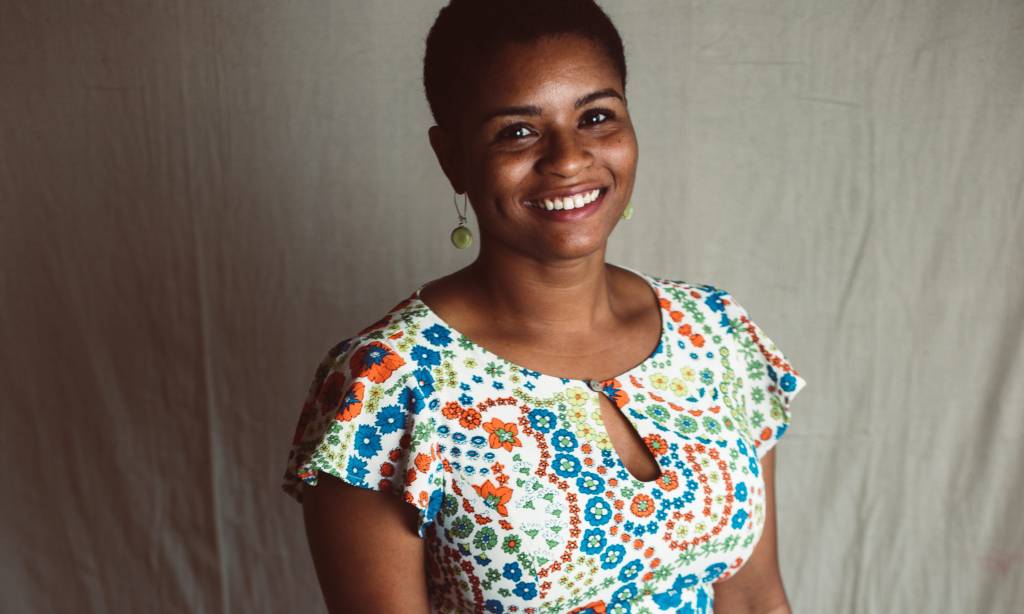Emma Carberry | April 19, 2021

Growing up in Houston, Jessica T. Brown (B.S. ‘18) learned about nature’s power through experience. “Houston moves through everything I do,” the alumna says. The combination of her family valuing outdoor time, her experiences with flooding, and the growing conversation about climate change impacted Brown during her formative years and led to her passion for environmentalism.
After earning her associate degree in communication and media studies at Lonestar College, she helped promote and co-teach creative writing workshops for Writers in the Schools in the Greater Houston area. During that time, she began to think about how she could use her communication tools to help others.
Brown enrolled at Texas State University, knowing she wanted to join her love of environmentalism with her gift for communication. To that end, she chose to major in public relations and mass communication and minor in geography. As a first-generation student, Brown had a unique understanding of the feeling of needing help and being afraid to ask for it. Her goal was to carve out a space for herself in which, through conversation, she could bring environmental education to those without access to learn about it in the same way she did.
While at Texas State, Brown began working for TreeFolks, an Austin-based nonprofit focused on planting trees, reforestation, and community education. She was the organization’s first full-time marketing and communications coordinator and covered their mass reforestation efforts in Bastrop County and Hays County after historic fires and flooding struck the areas.
After graduation, her desire to work and study in a new environment brought her to the pacific northwest and the University of Oregon (UO), where again she found a place for both the storyteller and the environmentalist in her. While applying to be a communications specialist in the provost’s office, she also applied for the university’s graduate program in environmental studies. Brown was offered the position and a place in the master’s program but chose to work a little longer in hopes of applying again in the future.
That year, she attended the first Understories Writer’s Workshop hosted by the UO’s Center for Environmental Futures. The workshop is designed to give a variety of students and professionals in environmental humanities the opportunity to engage with their disciplines and reach a wider public audience through literary narratives.
Brown used the time to write about being a Black woman doing environmental work and how relationships developed through caring for the land and sharing stories of grief. The experience made her wonder if storytelling could be a fundamental aspect of helping communities heal, further healing the landscapes where they live.
She didn’t expect to turn people into instant arborists, she says, but maybe storytelling could make them care a little more. As she put it, “I can help you plant these trees now, and I can help those trees grow with you.”
When applications opened, Brown reapplied to the UO’s environmental studies master’s program and was accepted for the fall 2020 term. A few months after her acceptance, the world saw growing media coverage of injustices towards the Black community and increased attention on racial disparities and the Black Lives Matter movement. Brown knew the outcome of her graduate degree had to involve uplifting the lives and stories of the Black community. So, she went to her graduate advisor with an idea for a terminal project – a nonprofit organization called Fernland Studios.
Brown’s project focuses on creating a five-year strategic plan for the nonprofit, which she is launching this summer. Her vision is to reimagine environmentalism through art and education and to offer scholarships to Black, Indigenous and people of color to work within artist residencies, educational retreats, and writing workshops. By increasing access to the multidisciplinary facets of environmentalism, she hopes to sustainably diversify those fields in the future.
Ideally, Brown would start the nonprofit in Oregon and later expand to the places she holds most dear – Texas, her home, and Guyana, her mother's birthplace. While the first phase of her plan focuses on increasing access for adults, she has plans to involve families and partner with organizations that can aid in building out youth programming in the future.
Her advice to Texas State students and alumni as she pursues her dreams? Keep going. While life and fear can be debilitating, tell yourself that you won’t be stopped. She credits much of her success to that mindset, and to knowing she is not alone. “There are people who want to see you succeed,” she says, “try to lean into that as much as possible.”
Share this article
For more information, contact University Communications:Jayme Blaschke, 512-245-2555 Sandy Pantlik, 512-245-2922 |
